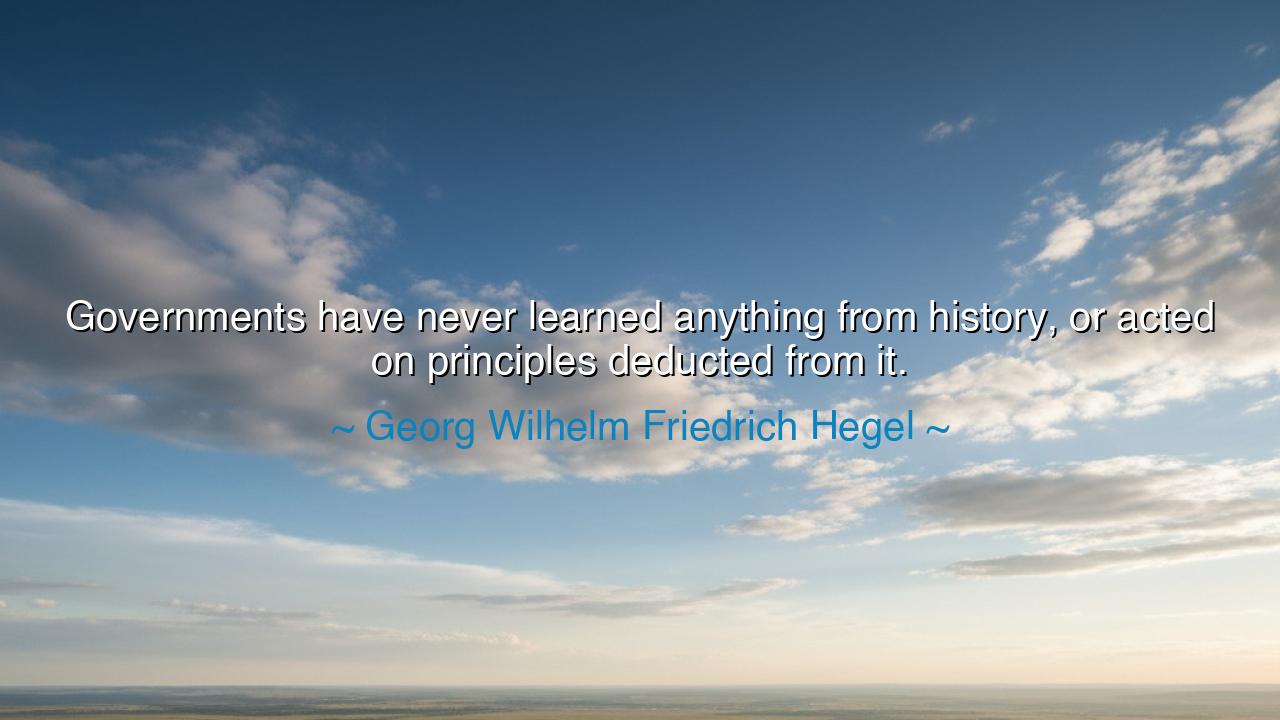
Governments have never learned anything from history, or acted on
Governments have never learned anything from history, or acted on principles deducted from it.






“Governments have never learned anything from history, or acted on principles deducted from it.” – Georg Wilhelm Friedrich Hegel
In these grave and resounding words, Georg Wilhelm Friedrich Hegel, the philosopher of history and spirit, speaks a truth as ancient as power itself. His lament, “Governments have never learned anything from history,” is not merely an accusation against rulers, but a reflection on the tragic blindness of human institutions. Hegel, who sought to uncover the laws that govern the unfolding of history, understood that while wisdom lives in the lessons of the past, the hands of power are too often guided by pride, ambition, and fear. He saw that the same mistakes return, clothed in new names, and that governments, though rich in records, rarely grow rich in understanding. His words are both a warning and a mirror: that civilizations rise and fall, yet the heart of man remains slow to change.
The origin of this quote lies in Hegel’s lectures on the Philosophy of History, where he explored the great movements of nations and empires. To him, history was not random chaos but a vast and purposeful unfolding — a manifestation of what he called the World Spirit, learning through the struggles of humanity. Yet even as history itself learned — through triumph and tragedy — Hegel saw that those who governed did not. Kings, ministers, and parliaments, bound by self-interest or the illusion of control, refused to heed the lessons written in blood across the centuries. Every war, he said, was the proof that governments forget; every collapse, the echo of lessons ignored. Thus, his statement is not cynicism, but a sorrowful truth born from watching humanity stumble upon the same stones again and again.
To understand Hegel’s insight, one need only look to the endless repetition of history’s follies. Empires rise, intoxicated by conquest, until greed consumes their vision. The Romans, who once promised order and law, fell to the very corruption and decadence they had condemned in others. Centuries later, the British Empire, proud of its civility and reach, sowed the seeds of its own undoing through arrogance and exploitation. And in the modern age, nations still march to war believing, as those before them did, that this time will be different. Yet each conflict proves Hegel’s words anew — that the past is a teacher governments dismiss until it is too late.
The same pattern is found not only in war, but in governance itself. The French Revolution, born of noble ideals, descended into terror because its leaders repeated the tyranny they had overthrown. They had not learned from the fall of the monarchs they despised; they had merely changed the name of power. Hegel watched such events unfold in Europe and saw a truth that still burns today: that knowledge without reflection leads to ruin. Governments remember facts, but not meanings. They commemorate anniversaries, but not lessons. They study history as chronicle, not as conscience.
And yet, within Hegel’s lament lies a quiet hope. For though governments may not learn, individuals can. The philosopher believed that history is not the work of faceless forces alone — it is shaped by human will, by men and women capable of reason, courage, and understanding. The statesman who studies history not as record but as revelation may yet break the cycle. When leaders govern not from pride but from wisdom, not from ideology but from insight, history’s mistakes can become stepping stones rather than graves. It is not the fault of history that men forget; it is the fault of those who refuse to listen.
Consider Winston Churchill, who, having studied centuries of conflict, warned of the rise of tyranny in his own time. When others sought to appease Hitler, believing peace could be bought with compromise, Churchill remembered the lessons of past empires and declared that “those who fail to learn from history are condemned to repeat it.” His foresight was not prophecy, but historical understanding. He stood as living proof that wisdom drawn from the past can change the course of nations — if only it is heeded. Thus, though Hegel spoke in despair, his truth becomes a challenge: if governments forget, then it falls to the wise to remind them.
So, my child of thought and memory, take this teaching deeply into your heart: do not be as those who read history yet learn nothing from it. Study the past not for curiosity, but for conscience. In every victory, see the seeds of arrogance; in every downfall, the warning of excess. Whether you lead a people or guide only your own life, remember that history is the echo of human choices — it rewards the humble and destroys the proud. When you face your own crossroads, ask not what is convenient, but what has been true through all the ages.
For as Hegel teaches, history speaks, but only the wise listen. Governments may forget, but the individual can remember. Let your mind be the place where the lessons of the past find voice. In your choices, let the wisdom of centuries live again — and in doing so, may you build not another empire of pride, but a legacy of understanding, humility, and peace.






AAdministratorAdministrator
Welcome, honored guests. Please leave a comment, we will respond soon